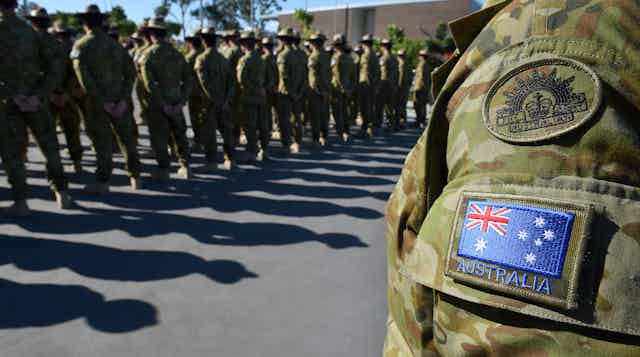It could be years before Ben Roberts-Smith and others are stripped of military awards for their service in Afghanistan and face Australian criminal court on war crimes charges, if in fact that ever happens.
Investigations of war crimes are difficult and time-consuming. In the meantime, calls for the Defence Department to continue to address the allegations against Australian Defence Force personnel have grown louder.
In the case of Roberts-Smith, the investigation is now being undertaken by a joint taskforce from the Office of the Special Investigator and the Australian Federal Police, rather than the AFP on its own. The decision to move the investigation resulted from issues with how evidence that could be used in a criminal case was collected in the Brereton inquiry. Such problems with evidence are difficult for investigation teams and courts that are not specifically designed to deal with war crimes.
Debate has also arisen in Australia over whether commanders as well as direct perpetrators ought to be held responsible for war crimes, and what the leadership failings in Afghanistan were. Such debates are relevant to the issue of individual and unit awards and honours.

Australia’s obligations under the Rome Statute
The public debate – and even expert opinion – has tended to overlook the fact that Australia’s response to the alleged war crimes in Afghanistan is governed primarily by its international obligations. These obligations outweigh any views about war crimes that may be held within the defence community or the general public.
Administrative measures undertaken by Defence cannot substitute for war crimes prosecutions. Australia is a full party to the 1998 Rome Statute, which is the cornerstone of international war crimes law and is reflected in Australia’s own domestic law covering war crimes.
Read more: Why investigating potential war crimes in Afghanistan just became much harder – and could take years
The Rome Statute requires that Australia fully investigate and punish war crimes committed by its forces, at all ranks. Australia has conducted war crimes trials of enemy combatants in the past, in which it has found direct perpetrators, their local commanders and their senior officers guilty of war crimes and has punished them accordingly.
To fail to comprehensively prosecute alleged war crimes now, because the defendants would be Australian, is a morally and politically untenable position. Comprehensive trials also offer the only path to the public understanding where culpability for war crimes sits along the military chain of command.
Removing medals and citations
The prompt removal of medals and citations, however, would provide Defence with an opportunity to condemn war crimes immediately, rather than waiting until formal trials can be held.
Defence honours and awards in Australia are awarded through an administrative process. Though awards have been revoked in the past for dishonourable conduct, it remains an unusual step. The process of conferring or revoking a high-level award needs the support of the government.
The Australian Defence Force has been criticised for moving too slowly to address public concerns over its record in Afghanistan. However, some attempts have been made.
In the aftermath of the Brereton Report, Chief of the Defence Force General Angus Campbell announced the Special Operations Task Group would be stripped of a Meritorious Unit Citation for conduct in Afghanistan. The announcement caused a media and political uproar, and then Prime Minister Scott Morrison reversed the decision.
It has since emerged that at least three senior officers, including Campbell, have attempted to return their own medals, awarded for distinguished command and leadership in action. In all three cases, the Coalition government denied this request.
Campbell has reportedly asked a group of former commanding officers to return their medals. In Senate Estimates, he stated such a move would represent a step towards accountability for the command failures in the Afghanistan operation.
The Labor government has appeared more willing for medals and awards to be handed back or stripped than its Coalition predecessor was.
The problems that Campbell has encountered in attempting to revoke honours, and in trying to hand his own back, highlight the fact that commendations have both military and political significance – which makes any decision to revoke honours particularly difficult.

Will the minister strip Roberts-Smith of his VC?
Ben Roberts-Smith is the public figurehead of Australia’s war crimes saga, so it is no surprise questions have been raised over whether he ought to keep his Victoria Cross. He was awarded the VC for an earlier action that is not connected with allegations of war crimes against him.
No Australian has ever had a VC revoked.
While a number of VCs were revoked in the United Kingdom, mostly during the 19th century, revocation has since been the subject of high-level debate.
In the defamation case, a civil court found on the balance of probabilities that Roberts-Smith had committed war crimes, but these actions do not technically erode the validity of his VC. At the same time, his earlier bravery did not protect him from allegations of war crimes, and there remains a moral and legal obligation for him to face criminal justice.
At face value, Roberts-Smith and his VC seem to be a different case – the medal was awarded to one soldier, for one action. To some, however, the medal seems also to mark out the recipient as a hero, or at least as a person of superior character. In this light, calls for the VC to be revoked in the wake of the defamation case are understandable.
As Australians reckon with this new and dark chapter of the country’s military history, the public will continue to ask who is most to blame for alleged war crimes committed by Australian forces in Afghanistan, until the question is comprehensively examined in the criminal court.

